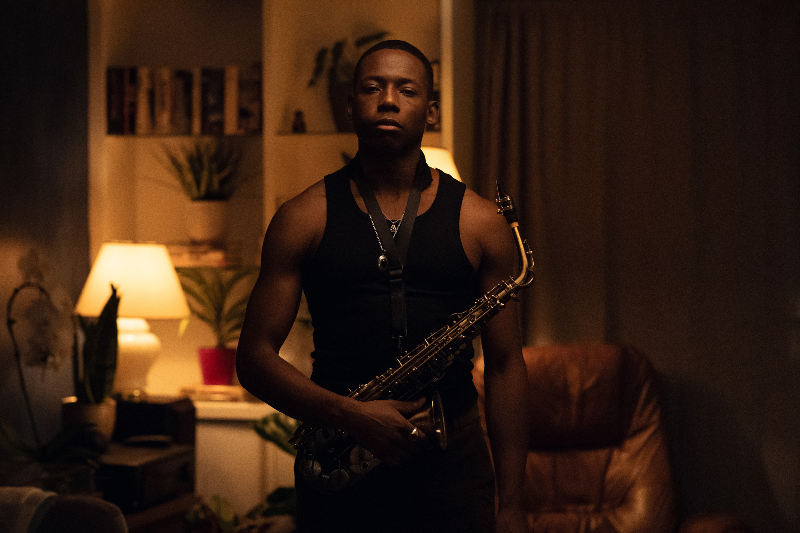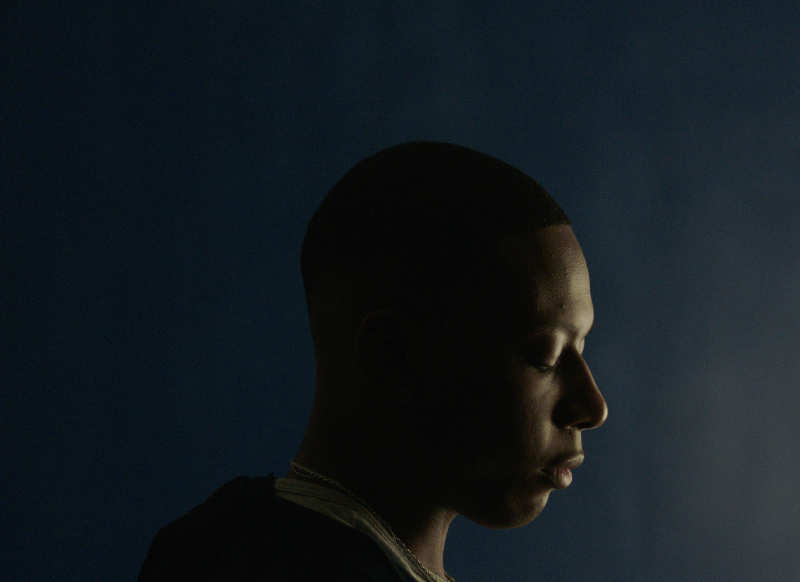TIFF ’21: A Deep Dive into Alumni Film ‘Learn to Swim’
Posted: Aug 30, 2021
Posted: Aug 30, 2021

Thomas Antony Olajide in ‘Learn to Swim’. Image by Samantha Falco.
Learn to Swim, the debut feature from CFC alum and director/co-writer Thyrone Tommy, is a beautiful and affecting exploration of love, loss and grief – and the expression of these feelings and experiences through music. This stunning film is as much a rumination on love and loss, as it is a window into the everyday life of musicians and the contemporary jazz scene.
The origin of Learn to Swim can be traced back to the CFC – while Thyrone and co-writer Marni Van Dyk were taking a walk through the gardens on campus during their residency in the Norman Jewison Film Program (Directors’ Lab and Writers’ Lab, respectively). Their conversation turned into ideation, which formed the basis of a story that would become a short film also titled Learn to Swim, developed during Thyrone’s residency. Eventually, through support from the Telefilm Talent to Watch Program (Learn to Swim was CFC’s nominated project for the program in 2018), along with support from CBC Films, the Toronto Arts Council, the CFC/Netflix Calling Card Accelerator and the CFC/Slaight Music Fund, that story became a feature – and that feature will see its world premiere at this year’s Toronto International Film Festival.
Learn to Swim boasts an impressive amount of CFC alumni collaboration across programs and years – a script by Marni Van Dyk and Thyrone, a moving and authentic performance by Thomas Antony Olajide as the lead Dezi Williams, production by Alona Metzer (producer), Lindsay Blair Goeldner and Mark Andrew Sirju (associate producers) and Matt Code (executive producer), editing by Baun Mah and Shaun Rykiss, music editing by Simon Poole, and original songs by TiKA, together with Casey MQ.
We sat down to speak with Thyrone, Alona and Thomas about Learn to Swim, the importance of building a creative team, what it means for their film to be at TIFF, and more. Read the full interview below.

Thyrone Tommy (director/co-writer), Thomas Antony Olajide (lead, Dezi Williams) and Alona Metzer (producer).
Thyrone: It started with a stroll through the CFC gardens with my co-writer Marni [Van Dyke] – she was at the CFC at the same time with us [Thyrone, Alona and Thomas] – and we were just talking about ideas. She had gone to Europe [and had these story ideas from her encounters there], and I talked about my time in New Orleans and music, and my experiences with having past love and losing past love and the grief of that. And we came to this idea of creating a story that was based on a poem, Not Waving But Drowning by Stevie Smith.
Alona: Thyrone, Thomas and I worked together on our short Mariner, which was at TIFF in 2016, and then we all applied to CFC that same year – and we all got in – so it felt like us three were a family going in. And then through the program, that’s where we met Marni, who wrote the film together with Thyrone, and that’s where we met Shaun and Baun our editors, and our EP, Matt Code, is also a CFC alum. Through CFC events and through our year [of the film program], we’ve met a lot of people that are part of our [creative] team and family.
Thomas: I applied [to the Actors Conservatory] spur of the moment – I was at a bit of a crossroad in my work. I had worked primarily in theatre up until then, and was thinking of transitioning into film after having done Mariner, but didn’t know how to make that transition and felt very insecure about stepping into film. So I wanted to use the CFC as a bit of a playground to see what it meant to be an actor in film and so decided to apply.
Thyrone: I think a lot of people search for who the most talented people are in the room, and don’t think too much about who that person is, and what sort of energy they bring to the space. I think one of the things that Alona and I have cultivated as we’ve grown together is really finding people who are very talented, but also bring a certain level of energy. I think Alona and I have taken pride and time in trying to find those people – especially in telling stories like this [Learn to Swim] that are very intimate and personal. They require a certain space to be provided for myself to work, for the actors to perform – so that’s something we’ve really been cultivating.
Alona: I’ve recently realized that one of my favourite parts of producing and filmmaking is that collaboration, and creating a family of people. I think you look at a lot of the great filmmakers that we really look up to – and you see that they tend to gravitate to working with the same people. So once you find your crew and develop a shorthand, you stick with those people.
Thyrone: I feel like the foundation of the films I’ve done hasn’t been so much the narrative structure, but more so the mood and feeling that they evoke – what kind of experience I want someone who’s viewing the film to feel during the runtime. So I think if I had a style it’d be that – it’s really about setting a mood or setting a tone, that someone it supposed to experience over the course of the film.
I like to work in stories that I feel are grounded to some degree. I always put some sort of surrealist element into the films I do, but I still think they should be grounded in things that are real, things that are around us. I’ve always said that I like telling stories about people that look like myself in places we exist but are often not seen.

Thomas Antony Olajide in ‘Learn to Swim’
Thomas: The most challenging aspect of the role was definitely the musical aspect. Dezi is a musician – he spends most of his life in music, and particularly with the saxophone. I played the saxophone in grade elementary school until Grade 7 – and very poorly at that – so, the challenge was how, in a short period of time with not a lot of resources, do I look like I have been carrying this instrument with me every day, all day.
I did have a great coach by the name of Yves Charuest who taught me the basics of the instrument, like basic fingering and also basic things like how to bring the instrument to and from your mouth in a way that a saxophonist would. Because I don’t read music, that was also very challenging. So Yves transcribed the music into a numerical notation – so he would associate each valve with a number – it’s incredible.
The most rewarding part was the artistic family. I was excited by the idea of getting up and meeting these individuals again to tell the story to the best of our abilities, and I was equally thrilled to stay up to the wee, wee hours of the morning to try to get everything in for the day (laughs). And to play opposite Emma Ferreira, who plays Selma Torres, and to explore those scenes with her – and jump in each time and try to do justice to Thyrone’s story, was very rewarding.
Thomas: Absolutely not! (laughs) I respect a musician’s life more than I ever have, but I respect it enough to never, ever touch it [the saxophone] again.
Thomas: I’m drawn to stories that stem from a place of need from the creators. When I feel like the creators need to say something, need to share something, need to exorcise something, or need to serve something, then I am naturally drawn into that space.
Transparency and communication are very important. I love to feel free to be transparent and communicative in a constructive way [throughout the creative process]. I think everyone involved should feel free to speak their need. Then I feel imaginative and I feel freer.
Alona: Thomas had so much energy and stamina [throughout filming]. He’s in every scene of the film and he really kept bringing it [his best] every day. He set such a good tone [on set] because he’s so thoughtful about the whole unit and the whole group – he had so much care for the entire crew and the other cast members.
Alona: We made a music movie on a micro budget during a pandemic – so everything was challenging! (laughs) But we’re very lucky that a lot of people believed in us and supported us – in big and small ways – which is really the only way these films can get made.
Of course COVID was a huge factor – we were 10 days away from shooting in March 2020 when we thought we were going to postpone for two weeks, and then we realized that it would be a larger shutdown. But Thyrone and I often talk about how all of these ups and downs – even though they always seemed so devastating – actually came to the benefit of the film and I think we made a better film because of all of those things that happened.
Thyrone: There were so many roadblocks that came up [throughout the making of the film] – and I’ve never trusted somebody during this process as much as I trusted Alona. She really created this space where we could really be involved in the work and continue to tell this story while the ship around us was sailing steady and sailing safe.
Alona: We were shooting in times where the [COVID case] numbers were rising, so it was very important to us to create a framework where people felt safe so that they could actually focus on the film and their job.
Thyrone: I’m really excited about people being able to be inside and experience the film in the traditional collective space. A lot of the festivals this year, especially in North America, were all digital – like SXSW and Sundance – so being a part of one of the first festivals [since COVID] where there will be in person [experiences], is exciting.
Alona: They [TIFF] have been a supporter of our work – the three of us [Thyrone, Alona and Thomas] – since Mariner, so it feels really meaningful to be able to go back with a feature – to have them support our progression. Also to premiere on home turf, and that people can actually attend, is really cool.
Thomas:
It is a question of visibility for me. To play a story that is specifically geared towards a Black Canadian experience is rare.
I don’t feel “an excitement” to be honest, it’s more a small relief – to know that there is space being made for that, because it’s not something I’ve experienced a lot of in my professional or personal life in Canada.
Thyrone: The first thing is to rest – and to take the time to enjoy it. But I’m always writing and always creating.
Alona: Same thing for me – rest! And then continue development on features I’m working on.
Thomas: I’m back on that self-taping train. I’m over here taping in my living room. Nothing tangible yet, but we’ll see!
CFC: There’s going to be a lot of calls after people see the film at TIFF.
Thyrone [to Thomas]: Keep your phone plugged in, bro!
This interview has been edited and condensed.
Learn more about Learn to Swim and get your tickets at tiff.net.
Share this post: